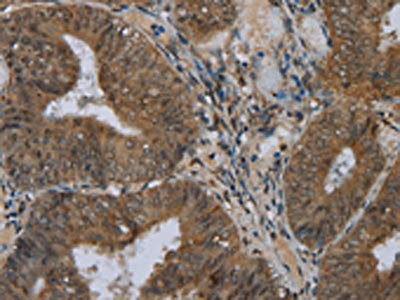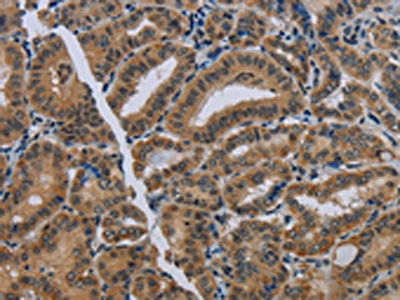NAT10 Antibody
-
货号:CSB-PA088333
-
规格:¥1100
-
图片:
-
The image on the left is immunohistochemistry of paraffin-embedded Human colon cancer tissue using CSB-PA088333(NAT10 Antibody) at dilution 1/40, on the right is treated with fusion protein. (Original magnification: ×200)
-
The image on the left is immunohistochemistry of paraffin-embedded Human thyroid cancer tissue using CSB-PA088333(NAT10 Antibody) at dilution 1/40, on the right is treated with fusion protein. (Original magnification: ×200)
-
Gel: 6%SDS-PAGE, Lysate: 50 μg, Lane 1-3: A549 cells, K562 cells, hela cells, Primary antibody: CSB-PA088333(NAT10 Antibody) at dilution 1/200, Secondary antibody: Goat anti rabbit IgG at 1/8000 dilution, Exposure time: 10 seconds
-
-
其他:
产品详情
-
Uniprot No.:Q9H0A0
-
基因名:NAT10
-
别名:ALP antibody; DKFZp434C116 antibody; FLJ10774 antibody; FLJ12179 antibody; FLJ23850 antibody; hALP antibody; KIAA1709 antibody; N acetyltransferase 10 antibody; N acetyltransferase 10 GCN5 related antibody; N acetyltransferase like antibody; N acetyltransferase like protein antibody; N-acetyltransferase 10 antibody; NAT10 antibody; NAT10_HUMAN antibody; NET43 antibody
-
宿主:Rabbit
-
反应种属:Human,Mouse
-
免疫原:Fusion protein of Human NAT10
-
免疫原种属:Homo sapiens (Human)
-
标记方式:Non-conjugated
-
抗体亚型:IgG
-
纯化方式:Antigen affinity purification
-
浓度:It differs from different batches. Please contact us to confirm it.
-
保存缓冲液:-20°C, pH7.4 PBS, 0.05% NaN3, 40% Glycerol
-
产品提供形式:Liquid
-
应用范围:ELISA,WB,IHC
-
推荐稀释比:
Application Recommended Dilution ELISA 1:2000-1:5000 WB 1:500-1:2000 IHC 1:50-1:200 -
Protocols:
-
储存条件:Upon receipt, store at -20°C or -80°C. Avoid repeated freeze.
-
货期:Basically, we can dispatch the products out in 1-3 working days after receiving your orders. Delivery time maybe differs from different purchasing way or location, please kindly consult your local distributors for specific delivery time.
相关产品
靶点详情
-
功能:RNA cytidine acetyltransferase that catalyzes the formation of N(4)-acetylcytidine (ac4C) modification on mRNAs, 18S rRNA and tRNAs. Catalyzes ac4C modification of a broad range of mRNAs, enhancing mRNA stability and translation. mRNA ac4C modification is frequently present within wobble cytidine sites and promotes translation efficiency. Mediates the formation of ac4C at position 1842 in 18S rRNA. May also catalyze the formation of ac4C at position 1337 in 18S rRNA. Required for early nucleolar cleavages of precursor rRNA at sites A0, A1 and A2 during 18S rRNA synthesis. Catalyzes the formation of ac4C in serine and leucine tRNAs. Requires the tRNA-binding adapter protein THUMPD1 for full tRNA acetyltransferase activity but not for 18S rRNA acetylation. In addition to RNA acetyltransferase activity, also able to acetylate lysine residues of proteins, such as histones, microtubules, p53/TP53 and MDM2, in vitro. The relevance of the protein lysine acetyltransferase activity is however unsure in vivo. Activates telomerase activity by stimulating the transcription of TERT, and may also regulate telomerase function by affecting the balance of telomerase subunit assembly, disassembly, and localization. Involved in the regulation of centrosome duplication by acetylating CENATAC during mitosis, promoting SASS6 proteasome degradation.
-
基因功能参考文献:
- immunohistochemistry staining of NAT10 in hepatocellular carcinoma tissues demonstrates that the cytoplasmic NAT10 is correlated with poorer prognosis compared with nuclear NAT10, while the membranous NAT10 predicts the poorest clinical outcome of the patients. PMID: 29634924
- Increased NAT10 expression levels are associated with shortened hepatocellular carcinoma (HCC) patient survival and correlated with mutant p53 levels. NAT10 upregulates mutant p53 level and might enhance its tumorigenic activity. Hence, it is proposed that NAT10 could be a potential prognostic and therapeutic candidate for p53-mutated HCC. PMID: 28859621
- NAT10 is acetylated in vivo and autoacetylated in vitro PMID: 27993683
- NAT10 translocates to nucleoplasm to bind and acetylate p53 at K120 upon cellular stress. PMID: 26882543
- The subcellular redistribution of NAT10 can be induced by decreases in GSK-3b activity. This redistribution increases cancer cell motility, and is, thus, correlated with invasive potential and poorer clinical outcome PMID: 24982245
- Identification of NAT10 as responsible for both 18S rRNA and leucine/serine tRNA acetylation. PMID: 25653167
- NAT10 is an ATP-dependent RNA acetyltransferase responsible for formation of N(4)-acetylcytidine (ac(4)C) at position 1842 in the terminal helix of mammalian 18 S rRNA. PMID: 25411247
- we identified hALP, a histone acetyl-transferase as a novel t-UTP PMID: 21177859
- hALP is a nucleolar protein, and the nucleolar localization is mediated by its carboxy terminal domain. PMID: 18677378
- The investigation suggested that hALP influences the activity of histone acetylation and could up-regulate telomerase activity through transactivation of hTERT promoter. PMID: 14592445
- The above results suggested that NAT10 could be involved in DNA damage response and increased cellular resistance to genotoxicity. PMID: 17180247
- chromosome de-condensation needs the function of an inner nuclear membrane (INM) protein hsSUN1 and a membrane-associated histone acetyltransferase (HAT), hALP. PMID: 17631499
- NAT10 may play an important role in cell division through facilitating reformation of the nucleolus and midbody in the late phase of cell mitosis, and stabilization of microtubules. PMID: 19303003
显示更多
收起更多
-
亚细胞定位:Nucleus, nucleolus. Midbody.
-
蛋白家族:RNA cytidine acetyltransferase family, NAT10 subfamily
-
数据库链接:
HGNC: 29830
OMIM: 609221
KEGG: hsa:55226
STRING: 9606.ENSP00000257829
UniGene: Hs.577281
Most popular with customers
-
-
YWHAB Recombinant Monoclonal Antibody
Applications: ELISA, WB, IF, FC
Species Reactivity: Human, Mouse, Rat
-
-
-
-
-
-























